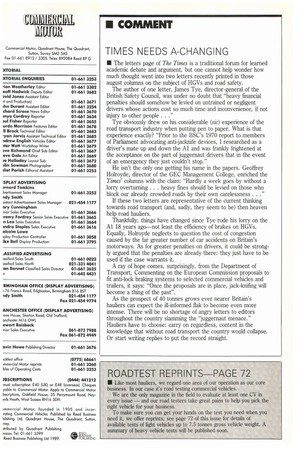TIMES NEEDS A-CHANGING
Page 5

If you've noticed an error in this article please click here to report it so we can fix it.
• The letters page of The Times is a traditional forum for learned academic debate and argument, but one cannot help wonder how much thought went into two letters recently printed in those august columns on the subject of HGVs and road safety.
The author of one letter, James Tye, director-general of the British Safety Council, was under no doubt that "heavy financial penalties should somehow be levied on untrained or negligent drivers whose actions cost so much time and inconvenience, if not injury to other people. . ."
Tye obviously drew on his considerable (sic) experience of the road transport industry when putting pen to paper. What is that experience exactly? "Prior to the BSC's 1970 report to members of Parliament advocating anti-jacknife devices, I researched as a driver's mate up and down the Al and was frankly frightened at the acceptance on the part of juggernaut drivers that in the event of an emergency they just couldn't stop."
He isn't the only one getting his name in the papers. Geoffrey Holroyde, director of the GEC Management College, enriched the Times' columns with the claim: "Hardly a week goes by without a lorry overturning. . . heavy fines should be levied on those who block our already crowded roads by their own carelessness. . ."
If these two letters are representative of the current thinking towards road transport (and, sadly, they seem to be) then heaven help road hauliers.
Thankfully, things have changed since Tye rode his lorry on the Al 18 years ago—not least the efficiency of brakes on HGVs. Equally, Holroyde neglects to question the cost of congestion caused by the far greater number of car accidents on Britain's motorways. As for greater penalties on drivers, it could be strongly argued that the penalties are already there: they just have to be used if the case warrants it.
A ray of hope comes, surprisingly, from the Department of Transport. Commenting on the European Commi8sion proposals to fit anti-lock braking systems to selected commercial vehicles and trailers, it says: "Once the proposals are in place, jack-knifing will become a thing of the past".
As the prospect of 40 tonnes grows ever nearer Britain's hauliers can expect the ill-informed flak to become even more intense. There will be no shortage of angry letters to editors throughout the country slamming the "juggernaut menace." Hauliers have to choose: carry on regardless, content in the knowledge that without road transport the country would collapse. Or start writing replies to put the record straight.
































































































































